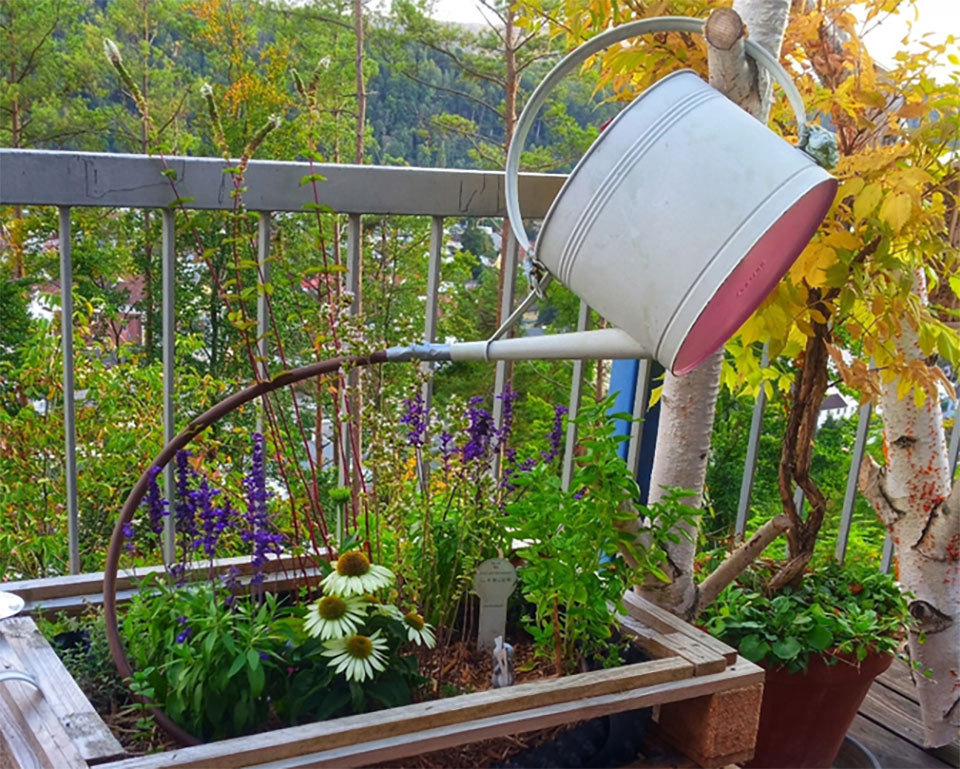Jochen Stocker is a Xerces member from Waldshut-Tiengen, Germany who has transformed his urban balcony into a thriving pollinator paradise. Growing up on the edge of the Black Forest in Wutöschingen, Germany, Jochen’s connection to nature began early. His childhood memories include lying by the Wutach River on summer days, with the hum of a bumble bee buzzing in his ear. After completing his training as a construction mechanic, Jochen pursued a career in social education and now supports young people during and after their training in a horticultural and landscaping company.
Jochen’s curiosity for invertebrates was piqued after hearing older neighbors lament the decline of insects. He decided to investigate and discovered the critical role invertebrates play in ecosystems and human survival. Observations on his own balcony revealed symbiotic relationships, such as ants thriving on his trumpet vine, sparking awe and curiosity. “I believe the potential to create habitat in a small area is enormous,” Jochen says. “Through the eyes of a bumble bee, even a small, flowering balcony bed can be huge.”
Jochen’s balcony garden features a diverse range of plants, including herbs such as thyme, oregano, chives, and mint. He also has planted purple coneflower, stonecrop, Viburnum lantana, blackberry, hornbeam, and black elderberry. This variety not only provides vital resources for pollinators but also showcases the incredible potential of urban gardening to provide food for gardeners working with small spaces.

After getting his garden going, Jochen says “I quickly realized that I needed too much drinking water for my plants on my fully sunny balcony. Sometimes the plants also dried out when we were away for a few days in midsummer. So I started experimenting a little.”
After some fine-tuning, Jochen developed an ingenious solution that he has named the "water-saving elephant." This DIY drip irrigation system, crafted from repurposed materials, reduces water usage by up to 50% while keeping his plants healthy and pollinator-friendly. He’s now working on the “water-saving elephant 2” to combine biodiversity with cooling effects for urban spaces.

Jochen’s efforts have not gone unnoticed. His ideas have been featured in Gardening Australia Magazine, and he shared his water-saving techniques on Rebecca Last-Guenette’s Canadian gardening blog for World Water Day. Matthew Shepherd, The Xerces Society’s Outreach and Education Director, says, “It is impressive the diversity of insects that he's observed in his balcony garden. The last I heard was about 20 species.” Jochen’s balcony now teems with life, including buff-tailed bumble bees, the European common blue butterfly, and even the striking Jersey tiger moth. “Seeing the transformation and the variety of visitors on my balcony is incredibly rewarding,” Jochen reflects. “It’s fun and amazing to share your space with other living beings. Every flowerpot counts.” Jochen’s story inspires us to rethink urban gardening and recognize the immense potential of small-scale efforts.
With innovative ideas and a deep passion for invertebrates, Jochen’s story exemplifies how small spaces can have a big impact on biodiversity.

